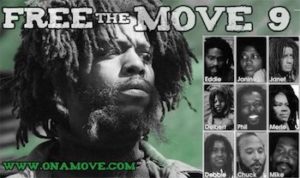
*On this date in 1972, we affirm the MOVE organization. MOVE is a Black militant anarcho-primitivist group founded in Philadelphia, Pennsylvania.
The name is not an acronym. The group lived in a communal setting in West Philadelphia, abiding by philosophies of anarcho-primitivism. The group combined revolutionary ideology, similar to that of the Black Panthers, with work for animal rights. When founded, the group was originally called the Christian Movement for Life. Its founder, John Africa (born Vincent Leaphart), was functionally illiterate. He dictated his thoughts to Donald Glassey, a social worker from the University of Pennsylvania, and created "The Guidelines" as the basis of the communal group.
Africa and his mostly African American followers wore their hair in dreadlocks, propagated by the Caribbean Rastafari movement. MOVE advocated a radical form of green politics and a return to a hunter-gatherer society while stating their opposition to science, medicine, and technology. They should not be confused with environmental racism. The group is mainly known for two major conflicts with the Philadelphia Police Department.
In 1978, a standoff resulted in the death of one police officer and injuries to 16 officers and firefighters. Nine members were convicted of killing the officer and received life sentences. In 1985, another firefight ended when a police helicopter dropped a bomb onto the roof of the MOVE compound, a townhouse located at 6221 Osage Avenue. The fire killed six MOVE members, including John Africa and five of their children, and destroyed 65 houses in the neighborhood.
The police action was strongly condemned. The MOVE survivors later filed a civil suit against the city and the police department and were awarded $1.5 million in a 1996 settlement. Other residents displaced by the destruction of the bombing filed a civil suit against the city and, in 2005, awarded $12.83 million in damages in a jury trial.
The group's founder chose this name to say what they intended to do. Members intend to be active because they say, "Everything that's alive moves. If it didn't, it would be stagnant, dead." When members greet each other, they say, "On the MOVE." They identify as deeply religious and advocate for life. MOVE members believe that as all living beings are dependent, their lives should be treated as equally important. They advocate for justice that is not always based within institutions. MOVE members believe that for something to be just, it must be just for all living creatures. Their followers changed their surnames to Africa to show reverence for what they regarded as their mother continent.
In a 2018 article about the group, Ed Pilkington of The Guardian described their political views as "a strange fusion of black power and flower power. The group that formed in the early 1970s melded the revolutionary ideology of the Black Panthers with the nature- and animal-loving communalism of 1960s hippies. You might characterize them as black liberationists-cum-eco warriors." He noted the group also functioned as an animal rights advocacy organization. He quoted member Janine Africa, who wrote to him from prison: “We demonstrated against puppy mills, zoos, circuses, any form of enslavement of animals. We demonstrated against Three Mile Island and industrial pollution. We demonstrated against police brutality. And we did so uncompromisingly. Slavery never ended; it was just disguised.”
MOVE members lived in a commune in a house owned by Glassey in the Powelton Village section of West Philadelphia. As activists, they staged bullhorn-amplified, profanity-laced demonstrations against institutions they opposed, such as zoos, and speakers whose views they opposed. Law enforcement authorities scrutinized MOVE activities, particularly under the administration of Mayor Frank Rizzo, a former police commissioner known for his hard-line against activist groups. As a radio announcer in the city, Mumia Abu-Jamal was associated with the organization as a sympathizer. We chose this date because it is the same month and date the city of Philadelphia was founded 190 years earlier.